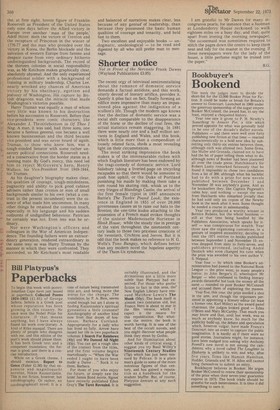Shorter notice
Not in Front of the Servants Frank Dawes (Wayland Publications £3.95) The recent orgy of televisual sentimentalising about the romance of domestic service demands a factual antidote, and this work, utterly devoid of literary artifice, provides it. Quietly it piles fact on fact, finally forming an edifice more impressive than many an impassioned plea against the indignities of a scullion's life. Though the modern age knows that the decline of domestic service was a social shift comparable to the disappearance of the horse or the decline of coal fires, the actual statistics remain staggering. In 1891 there were nearly one and a half million servants in England and Wales, and this book, which is little more than a compendium of loosely related facts, sheds a most revealing light on their circumstances.
The most striking impression the book makes is of the immeasurable riches with which English literature has been endowed by the tragi-comedy of domestic service. Lord Salisbury taking a liveried page on tricycling escapades so that there would be someone to push him uphill, or the Duke of Portland punishing his maids by making them take a turn round his skating rink, whisk us to the very fringes of Blandings Castle; the arrival of the first female typist in 1897 announces Barrie's The Twelve Pound Look; the existence in England in 1851 of over 20,000 governesses causes us to raise our hats to the Brontes; the one-time kudos attaching to the possession of a French maid evokes thoughts of the sinister Mademoiselle Hortense in Bleak House; while the steady rise in prestige of the valet throughout the nineteenth century leads to those two priceless creations of the twentieth, Crichton and Jeeves. But it is odd that the book makes no reference to H. G. Wells's Tono Bungay, which defines better than any modern novel the hopeless asperity of the Them-Us syndrome, I am grateful to Mr Dawes for many incongruous pearls, for instance that a footman at Londonderry House reckoned to walk eighteen miles on a busy day, and that, quite apart from ironing the morning newspaper. "the nousemaid was sometimes required to stitch the pages down the centre to keep them neat and tidy for the master in the evening. It these newspapers were for the lady of the house, a little perfume might be ironed into
the paper." B.G.


































 Previous page
Previous page